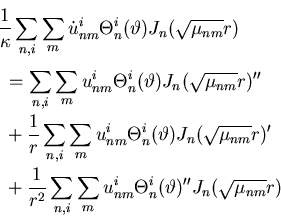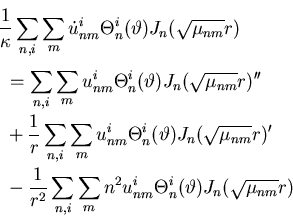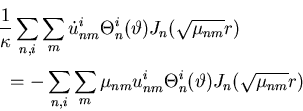
We again expand all variables in the problem in generaized Fourier series:

Let's start with the initial condition:
![]()
To find the Fourier coefficients finm, we need orthogonality
for both the r and ![]() eigenfunctions. Now the ODE for the
eigenfunctions. Now the ODE for the
![]() eigenfunctions was in standard form,
eigenfunctions was in standard form,
![]()
![]()
As a result, our orthogonality relation for the Fourier coefficients
of initial condition ![]() becomes
becomes

The r-integral in the denominator can be worked out using Schaum's Mathematical Handbook 24.88/27.88:

Hence, while akward, there is no fundamental problem in evaluating as many finm as you want numerically. We will therefor consider them now ``known''.
Next we expand the desired temperature in a generalized Fourier series:
![]()
Put into PDE ![]() :
:

Because of the SL equation satisfied by the ![]() :
:

Because of the SL equation satisfied by the Jn:

Hence the ODE for the Fourier coefficients is:
![]()
![]()
At time zero, the series expansion for u must be the same as the one for the given initial condition f:
uinm(0) = finm
Hence we have found the Fourier coefficients of u and solved the problem.